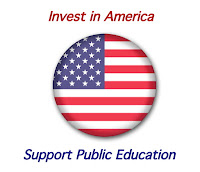Be sure to enter your email address in the Follow Us By Email box in the right-hand column of our blog page to be informed when our blog posts are published.
QUOTE OF THE WEEK
"In our society, teaching is not a high status position. It used to be considered women’s work, probably still is by many people. How wonderful it would be if we had fully transcended the cruelty of the old joke: “Those who can, do; those who can’t, teach; those who can’t teach, teach gym.” But we haven’t. I regularly hear legislators in my state explaining that if someone who knew what he was doing were put in charge, teachers would be forced to improve test scores immediately. The implication, of course, is that teaching is simply a matter of the production of test scores, and teachers don’t produce.
"The tragedy of this kind of thinking is that the same teachers whom people attack and insult are the human beings to whom we trust the formation of our children. The opinion polls tell us that we handle this contradiction by learning to know, respect, and appreciate our own child’s teacher even as we fail to protest the barrage of attacks on teachers in general." -- Jan Resseger in Sylvia Allegretto Documents Large and Persistent Teacher Pay Penalty
TEACHERS' PAY PENALTY GROWS
Sylvia Allegretto Documents Large and Persistent Teacher Pay Penalty
Why is it okay to pay teachers less than other professionals with similar training? Is it because most teachers are women? Is it because we don't really care about our children after all?
From Jan Resseger
In the introduction to her annual report on the teacher pay penalty, published last week by the Economic Policy Institute (EPI) and the Center for Economic and Policy Research, Sylvia Allegretto acknowledges the challenges teachers face: “Teachers have one of the most consequential jobs in the country—they have the future of the U.S. in front of them every day. But teaching is becoming a less appealing career choice for new college graduates. Not only are levels of compensation low, but teaching is becoming increasingly stressful as teachers are forced to navigate battles over curriculum and COVID-19 related mandates as well as rising incidence of violence in schools. Low pay makes recruiting and retaining highly qualified teachers difficult.SUPPORT PUBLIC EDUCATION
Here are Allegretto’s conclusions about the trend in teachers’ wages and compensation through 2022:Allegretto explains: “Because public school teachers must attain at least a bachelor’s degree to teach in the U.S., this research compares teachers with college graduates working in other professions… Over the past two decades, the weekly wages and total compensation of public school teachers have fallen further and further behind… Recent high inflation has significantly reduced the average weekly wages of teachers but has had less of an effect on other college graduates… The erosion of relative weekly wages for teachers continued apace in 2022.” “Teachers generally receive a higher share of their total compensation as benefits than other professionals do, partially offsetting the weekly wage penalty.” But, “the benefits advantage for teachers has not been enough to offset the growing wage penalty.”
- “The pay penalty for teachers—the gap between the weekly wages of teachers and college graduates working in other professions—grew to a record 26.4% in 2022, a significant increase from 6.1% in 1996.
- “Although teachers tend to receive better benefits packages than other professionals do, this advantage is not large enough to offset the growing wage penalty for teachers.
- “On average, teachers earned 73.6 cents for every dollar that other professionals made in 2022. This is much less than the 93.9 cents on the dollar they made in 1996.”
The Plot to Take Down Public Schools
From Diane Ravitch
Recently the Network for Public Education and the Education Law Center sponsored a zoom conversation with Nick Surgey. Nick is an experienced investigative journalist who works with an organization called Documented, which digs into the Dark Money groups undermining Public schools and other democratic institutions. Nick has done the legwork that identified the money and people behind the home schooling movement, as well as the rightwing Alliance for Defending Freedom. He has worked with the Center for Media and Democracy and other pro-democracy organizations.
This is a discussion you should definitely tune into.
INDIANA AND FORT WAYNE LOCAL NEWS
Five of our articles this week come from the Fort Wayne Journal Gazette. Please consider subscribing to this important local source of news and information. Remember "all politics is local," and education is funded through politics. See the link at the end of this post.
FWCS referendum will help in coping with school — and life
FWCS works to help students cope with mental health issues.
From the Fort Wayne Journal Gazette
On Oct. 7, The Journal Gazette’s editorial board questioned the need for Fort Wayne Community Schools’ safety and well-being referendum on the Nov. 7 ballot, asking the question: “Should schools go even deeper into providing for student mental health and wellness?”
The answer from the SAFER FWCS Political Action Committee is simple:
If not us, then who?
The most recent Indiana KIDS COUNT data from the Indiana Youth Institute paints a bleak picture. In 2021, more than 1 in 4 high school students reported having seriously considered attempting suicide, and nearly half of all high school students reported being sad or feeling hopeless every day for at least two weeks.
These statistics are not surprising to educators, who saw a significant decline in student mental health during and after the COVID-19 pandemic. The same report showed teachers at 62% of schools tried to increase student knowledge on suicide prevention in a required course in grades 6-12. That is up from fewer than 20% of schools doing so in 2012.
Should schools be responsible for solving this mental health crisis? Maybe not, but Fort Wayne Community Schools has never been a district to throw up its hands and say, “It’s not our fault. There is nothing we can do. Someone else needs to fix it.”
FWCS is already seeing what its plan can do in a pilot at South Side High School.
In voting to put the referendum on the ballot, the FWCS Board of School Trustees sent a message: Not on our watch. FWCS will not stand by when there are steps that can be taken inside schools to create an even safer learning environment.
New Indiana law stokes worries for LGBTQ+ students
The new laws affecting LGBTQ+ students impact the daily lives of real people.
From the Fort Wayne Journal Gazette
Snider High School’s gay-straight alliance no longer takes attendance or maintains a membership roster, and participants are mindful about what’s visible to their faculty advisers during the club’s weekly one-hour meetings.
Known as the Rainbow Connection, the group wants to reduce the risk of teachers seeing members’ deadnames – names used before a gender transition – because of state legislation that took effect July 1. It requires school districts to notify a student’s parent or guardian if the student requests a name or pronoun change.
The new rule interferes with Rainbow Connection’s priority of keeping members safe and letting them be true to themselves, participants say. Students might have parents who are unsupportive or could potentially endanger them for not being cisgender – a term meaning not transgender – or straight, said Phoenix Bodner, co-president.
“Adjusting to it when the school year started actually delayed Rainbow Connection’s opening by a couple weeks because we needed to find a way to work around the fact that it posed a serious risk to the safety and security of our members,” Bodner said by email.
Critics, including the American Civil Liberties Union of Indiana and the Indiana Educational Equity Coalition, raised such concerns when legislators proposed the bill. It also prohibits schools from teaching human sexuality before fourth grade.
South Side sees success with piloted Safer FWCS initiatives
From the Fort Wayne Journal Gazette
The South Side High School that student Olivia Soto attends as a senior is different from the South Side that welcomed her as a freshman.
The atmosphere has transformed from a place where students would walk through hallways with their heads down – phones out and earbuds in – to a vibrant school where teens smile, wave and high-five others.
“You feel seen and present at the school,” Soto told the Fort Wayne Community Schools board Monday during a presentation about safety updates. “You’re not just there to learn. You’re there making connections, and you’re in this community at South Side.”
Although the safety presentation included districtwide information, South Side received much of the focus because it is piloting elements that FWCS would like to expand to other schools with referendum funding.
Enrollment growth prompts Northwest Allen County Schools to eye redistricting
From the Fort Wayne Journal Gazette
Enrollment growth in Northwest Allen County Schools this fall exceeded a demographer’s forecast by about 35%, and a surge in elementary students has prompted the district to reexamine its attendance areas.
Superintendent Wayne Barker stressed to the school board Monday that the overall 2.7% enrollment increase – an addition of 217 students – is positive, especially considering many Indiana districts are experiencing declining enrollment.
“This is a good thing for Northwest Allen County Schools,” he said.
FWCS proposal would boost teacher pay, including starting salary
FWCS has the lowest starting teacher salaries in the county. Increases would put the largest school system in the county in line with the others.
From the Fort Wayne Journal Gazette
A tentative two-year teachers contract would increase Fort Wayne Community Schools’ starting salary to $46,627 – making the district more competitive with its Allen County neighbors.
As proposed, the salary schedule will increase by 3% this academic year and 1% next year. But depending on how educators progress on the salary schedule – which considers performance and education levels – their pay could increase between 5.8% and 9.9% over two years.
The school board discussed these and other details Monday, two weeks before the elected leaders are expected to ratify the contract.
“I’m happy to pay them every penny we can,” board member Steve Corona said.
 |
| October is ADHD Awareness Month. Click for a link to the ADHD Awareness website. |
**Note: The Fort Wayne Journal Gazette is behind a paywall. Digital access, home delivery, or both are available with a subscription. Staying informed is essential; one way to do that is to support your local newspaper. For subscription information, go to fortwayne.com/subscriptions/ [NOTE: NEIFPE has no financial ties to the Fort Wayne Journal Gazette]
†Note: NEIFPE's In Case You Missed It is posted by the end of the day every Monday except after holiday weekends or as otherwise noted.
###



No comments:
Post a Comment